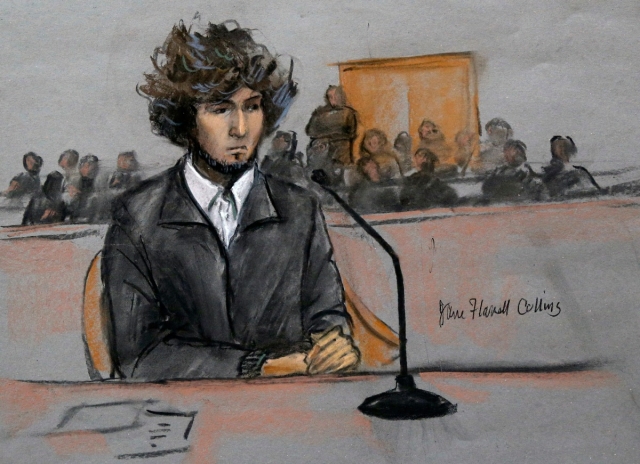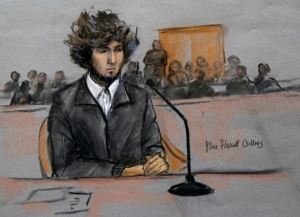Federal Jury Sentences Dzhokar Tsarnaev to Death
The State of Massachusetts abolished the death penalty in 1984. But while the State may no longer execute people, its residents can still be handed down the sentence. Dzhokar Tsarnaev, an American citizen born in Kyrgyzstan, raised in the Boston suburb of Cambridge and guilty (along with his elder brother Tamerlan) of the infamous 2013 Boston Marathon bombings, has been sentenced to death by a federal jury.
The 21-year old was found guilty of setting off two homemade bombs at the Boston Marathon, killing three people and injuring at least 260 – as well as the shooting of Sean Collier, a 27-year old campus policeman at the Massachusetts Institute of Technology. Tsarnaev was tried in a federal court because, despite the crime being planned and carried out in Massachusetts, the authorities deemed it a crime against the United States rather than against Massachusetts.
Dzhokar’s elder brother Tamerlan was 26 at the time of the attack, and was killed in a shootout with police on 18 April 2013, days after the Boston Marathon. Dzhokar escaped but was found the next day hiding in a boat. The younger brother was found guilty of 30 charges ranging from murder to conspiracy to using weapons of mass destruction. Six of the 30 charges were eligible for the death sentence.
While few doubted his guilt in the bombings and shooting of Collier, the handing down of the death penalty was not viewed as a foregone conclusion. In order for that sentence to be given, the 11-person jury had to unanimously decide in favor of the prosecution. After 14 hours of deliberation conducted over three days, the jury issued the verdict: death due to his role in the planting of the second of two bombs that went off at the Boston Marathon. The instance marks the first time in the post-9/11 era that the federal government has issued the death penalty.
The responses of the survivors of the attack were mixed. Several, including Adrianne Haslet and Sidney Corcoran, whose mother lost both her legs in the bombing, expressed approval for the verdict, as did many other survivors and some relatives of the deceased. Bill and Denise Richard – whose eight-year old son Martin was killed along with 29-year old Krystle Campbell and 23-year old Lingzi Liu, a university student from China – expressed unequivocal opposition to the death penalty. Their daughter Jane survived the attack but not without losing a leg.
Dzhokar Tsarnaev’s defense team did not attempt to assert his innocence. Rather, they focused on the trial’s second stage, attempting to spare him death by persuading the jury that he had acted under the manipulation of Tamerlan. Casting the elder Tsarnaev as the attack’s “mastermind,” chief defense attorney Judy Clarke asserted that he both constructed the bombs (which were made from store-bought pressure cookers, gunpowder and shrapnel made from nails, screws and BBs) and planned the attack, with Dzhokar playing a supporting role.
The defense is now likely to initiate a lengthy appeals process, as is standard practice following death penalty rulings. While Tsarnaev’s guilt will not be overturned, the verdict of death could be. It has been speculated that the defense will push for a retrial outside the State of Massachusetts, arguing that because Tsarnaev was tried in the same jurisdiction in which he committed the crime, there was no chance of the jury being impartial.
Joseph Larsen












